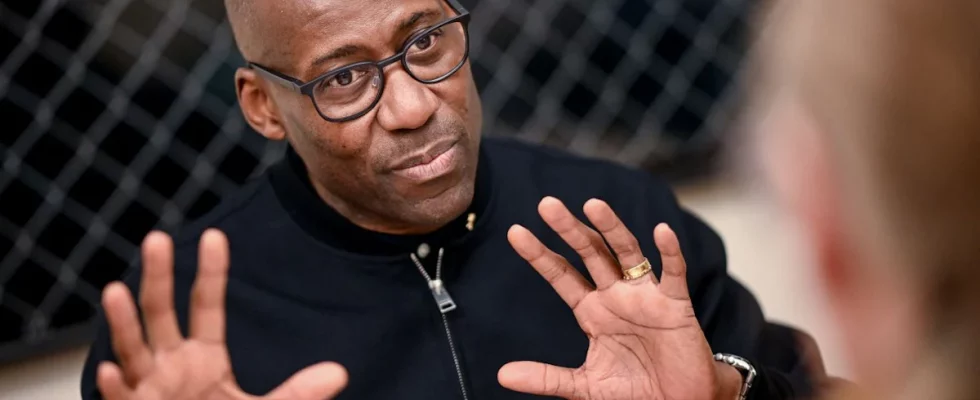When a conference is dedicated to colonialism, pro-Palestinian protests are not excluded. If Minister of State for Culture Claudia Roth and Berlin’s Senator for Culture Joe Chialo come, like on Thursday to the Berlin House of World Cultures, they are practically guaranteed. The big surprise at the opening event of the three-day conference “Remembering Colonialism” was something different. Here we could observe the rare occurrence of how a disruption remained just a disruption and did not become a scandal, a political issue, or a catastrophe. And the fact that this discursive feat was not achieved by politicians but by civil society does not have to be bad news at all.
The occasion of the conference was almost formal. For two years, the Berlin initiatives Decoloniale, Decolonize Berlin, the Korea Association and the Africa Council, korientation and Adefra developed a concept for Berlin’s memory of colonialism on behalf of the Berlin House of Representatives. Because Berlin doesn’t just have a few streets named after murderers. From November 1884 onwards, the capital of the German Empire was the venue for the “Congo Conference”, where the major powers of the time divided the African continent – if it had not already done so – between themselves.
On Thursday afternoon, the Berlin initiatives led by Ibou Coulibaly Diop presented their draft to Senator for Culture Chialo. In it they call for new places of learning, city markings that are reminiscent, for example, of the 1933 colonial exhibition on the exhibition grounds or of the black activist “Martin” Dibobe, and – subsequently – the renaming of streets. The concept was to be publicly presented and discussed at the conference in the House of World Cultures.
But then what was to be expected happened. When Claudia Roth entered the stage, she was saying a few sentences when the audience shouted “Viva, via, Palestine” and about half a dozen mostly visibly non-Arab protesters lined up in front of Roth, speaking in German and English, among other things demanded that there should be “no culture of remembrance without Palestine.” Similar to previous incidents, the disruptions were staggered. This was followed by a “Stop the Genocide” heckle here, a “No Silence, No Complicity” sign there, then a “Shame-on-you”. Roth didn’t say anything else at first.
Moderator Camara: with confidence, wisdom and warmth
What also came from the audience from the first second was: displeasure at the disruption, boos, “What nonsense.” It can certainly be assumed that many visitors and organizers were in solidarity with the Palestinian cause and the Palestinian suffering caused by Israel’s war. Just not like this and not here. The fact that one group of troublemakers after another was finally persuaded to fold up the signs and leave the hall was thanks to HKW manager Bonaventure Ndikung, project manager Diop, but above all it was thanks to the moderator Miriam Camara.
According to Camara, civil society, not politics, designed this conference; they had been working towards this moment for two years. Camara spoke of the “pain” that she sensed in the others, but also of the “pain within us.” One of her most common words was “respect.” It was a performance so confident, so intelligent and so warm-hearted that one wonders what would have happened if the German government had shown a little of Camara’s sovereignty, wisdom and warmth in the Middle East debates of the last few months. Maybe, who knows, the bitterness everywhere wouldn’t be so great today.
Meanwhile, Roth and Chialo watched, said nothing, and couldn’t or didn’t have to do anything else. All other reactions, however, were enlightening. The Green Party politician Roth has caused a stir in the country’s memorial sites because she wants to give the country’s memorial culture wide space to come to terms with colonialism. When the troublemakers had left and she went back to the desk, she got confused and needed a few minutes to find her way back into her text. She describes coming to terms with colonialism as a “cultural policy priority” for the federal government. It is no secret that it is her heart’s desire.
Senator for Culture Chialo: Coming to terms with colonialism is a blank space
CDU Senator Chialo, on the other hand, speaks of his parents, who come from Tanzania, and he also buried his father there. He, Chialo, knows “as a European” that coming to terms with colonialism is a blank space. But it’s also about starting something new together. Chialo speaks loudly, his voice firm. When the audience shouted “Palestine” again, he raised his voice and just kept talking until the heckling stopped. It seems unshakable and hardened, but also distant. As if none of this was any of his business, as if he was talking to himself.
Maybe that’s deceptive. Because then Chialo makes a promise. He wanted to make today’s Wilhelmstrasse 92, once the location of Bismarck’s Reich Chancellery and thus also the “Congo Conference”, available for projects about colonialism. He could very well imagine it as a place of learning. Maybe something will work out.

